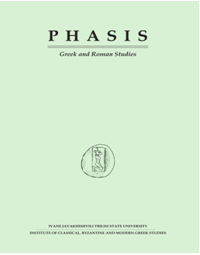Topical Issues in Ancient Greek Scholia and Their Presence in Modern Science
DOI:
https://doi.org/10.60131/phasis.17.2014.2320Abstract
The paper concerns scholia – the least developed, but a very important genre of ancient literature. Scholia were regarded in Antiquity and the early Middle Ages as a critical literary genre, which task was to comment on the literary text, and thus to facilitate its reading and comprehension. Scholiasts were often also ancient scholars and therefore the notes written in the margins of manuscripts were of high scientific value. Numerous themes and issues addressed by the scholiasts were firstly acknowledged and studied by scientists from the previous era, but since then they continued their presence in scientific research and have become also the matter of discussion of contemporary researchers. In this paper I aim to demonstrate the presence of scholia in different fields of knowledge such as: philology (etymology, grammar, punctuation, metrics, rhetoric, poetics of tragedy), ethnology, geography, history, mythology, religion, etc. The paper also examines the relations of scholia with other fields of knowledge. Every separate thematic group is defined with a set of examples from the ancient commentaries on the Persians by Aeschylus. The still little interest of researchers in this kind of critical literary genre has become a reason for making the ancient commentaries the main theme of my paper. Despite the undoubted value of scholia, there are only a few translations of them in modern languages, so all the precious information contained in the collection of comments are not sufficiently used by scientists from different fields of science.Downloads
Published
2014-01-01
Issue
Section
Articles
License
Copyright (c) 2014 PHASIS

This work is licensed under a Creative Commons Attribution-NonCommercial 4.0 International License.


